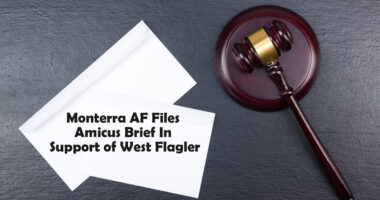Skip to content

Florida Gov. Ron DeSantis and President Joe Biden’s administration don’t agree on much these days. There’s even a chance they run against each other in the 2024 presidential election.
However, there is currently one issue in which each wants the same outcome. They both want the D.C. Court of Appeals to overturn a district court ruling that invalidated the Florida gaming compact.
Last November, Judge Dabney Friedrich ruled in favor of West Flagler Associates, the ownership group of two pari-mutuel facilities that sued over Florida sports betting provisions. Friedrich ruled that the ‘hub-and-spoke’ sports betting model used to organize the industry violated the Indian Gaming Regulatory Act.
In late August, Florida Attorney General Ashley Moody filed an amicus curiae brief in support of the federal government’s appeal. West Flagler listed the Department of the Interior Secretary Deb Haaland as the plaintiff since she was the one that approved the compact in August 2021.
The amicus brief filed by the Sunshine State was one of several briefs supporting the government’s attempts to restore it. A favorable result in the appellate court could result in the immediate relaunch of sports betting in Florida.
However, it almost doesn’t matter what the ruling is since whoever loses the case at this level. Whichever legal team ends up losing will probably file for the Supreme Court to hear the case. The only difference will be if there is sports betting while the nation’s highest court decides whether to hear it.
What is in the brief?
Moody filed the brief to advance three main arguments in support of the federal government. The feds claim that the district court decision should be reversed.
On the other hand, the arguments advanced by the state fall more into the category of “us too” arguments. Instead of making new arguments, they effectively reinforce the positions already established by the federal government.
The Compact does not violate IGRA
Moody’s first argument is that the 2021 Florida gaming compact does not violate the IGRA and that Friedrich was incorrect in her assessment of the law. The brief argues that the IGRA commands that the Secretary of the Interior is authorized to approve compacts “governing gaming on Indian Lands.”
The brief argues that although the law says Secretary Haaland is authorized to approve compacts “governing gaming on Indian lands,” it does not preclude a compact from also allowing gaming to take place away from tribal lands.
The argument goes on to assert that there is a “mistaken premise that the compact itself ‘authorizes’ such gaming as a matter of law.”
Moody argues the compact only authorizes gaming on tribal lands. But the other authorization for gaming off tribal lands was done “as a matter of Florida law (emphasis removed).”
This argument, while appealing, seems difficult to reconcile. There are a number of statements made at the time the compact was signed into law, where there is no delineation of authorizations.
The AG’s brief attempts to argue that enacting legislation served as the authorization to allow for the in-question gaming.
Doubling down on the Wire Act and UIGEA not applying
Her second argument is that neither the Wire Act nor the Unlawful Internet Gaming Enforcement Act provides a basis for the lower court’s decision. She takes aim at what are probably the weakest arguments raised by the plaintiff in district court.
In fact, it is unclear whether the Wire Act implicates tribal betting at all as the law only refers to interstate betting or foreign commerce.
However, the Constitution’s commerce clause is the basis for the Wire Act’s enactment. The clause mentions a third type of commerce, commerce “with the Indian tribes.” But that is absent from the scope of the Wire Act.
The plaintiff’s arguments regarding both the Wire Act and the UIGEA appeared to be a secondary argument. As a result, it’s almost surprising to see an amicus brief devote so much time to attacking it.
Moody wraps up her second argument by reminding the court of one of the Seminole Tribe’s arguments. Should the court choose, it could reverse the decision on the basis of the failure to add the tribe as a party.
Give me a piece of the pie
The third and final argument advanced by the AG is that the district court erred. Friedrich went beyond even what the plaintiffs suggested at oral arguments by ruling the whole compact should be thrown out. By comparison, the plaintiffs simply wanted to have specific provisions regarding the sports betting market invalidated.
The brief argues the appropriate remedy is to exercise the infringing provisions of the compact. Not throw out the entire agreement. Moody argued there was no reason to believe the compact would not have been approved without the online component.
Therefore, the proper remedy is simply to cut out the online component and allow the rest of the deal to go into effect. Aside from sports betting, the deal also allowed for Seminole-owned casinos to spread craps and roulette. It also gave pari-mutuels the ability to spread some house-backed card games similar to blackjack.
The AG goes wraps up the section by defending a generally weak argument from the Department of the Interior. She said the agency didn’t make an error by not arguing for severability as the plaintiffs themselves raised the issue.
So are Biden and DeSantis best friends now?
The entire situation brings a bit of surprise to anyone that follows politics for two main reasons:
- The federal government is defending something that originated in Florida
- The State of Florida is backing the Biden administration in their argument
The reality is that for all the political blustering of the last decade, the Justice Department defends federal laws whether they were written by Democrats or Republicans.
It is very rare that the DOJ does not defend a federal law. Additionally, this typically occurs when there has been a federal policy shift. The IGRA was a product of the Reagan administration and has been defended by every administration since its passage.
Similarly, Florida wants the compact. The state government wants, and probably needs the revenue-sharing payments laid out in the agreement. Analysts estimated those payments to be worth about $500 million annually. The state will do what it needs to to get that money, even if it means agreeing with the Biden administration.
What’s next?
The next scheduled briefs aren’t until the federal government responds on or before October 3.
West Flagler Associates’ first brief is due three days later. At which point, things will heat up with the briefing likely concluding on November 14.
The court will then decide if oral arguments are necessary. They will hand down a decision following those closing arguments. The judges will likely make a ruling in early 2023.
Photo by Shutterstock / E V McLaughlin




